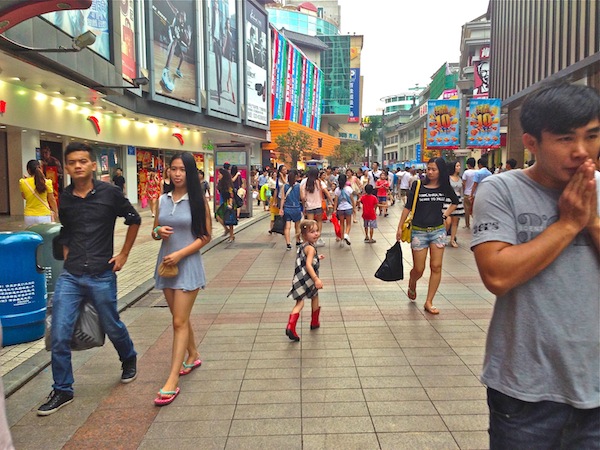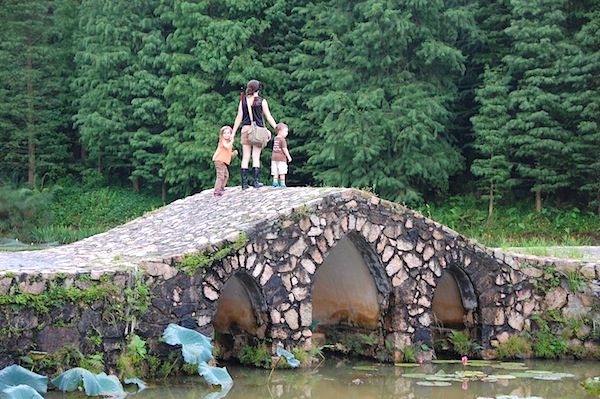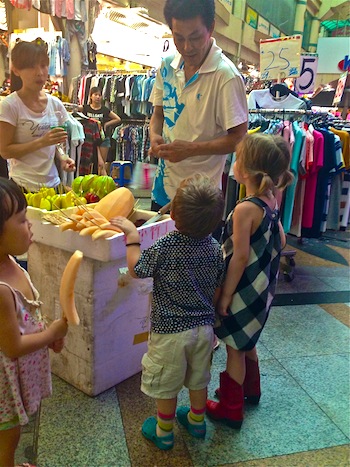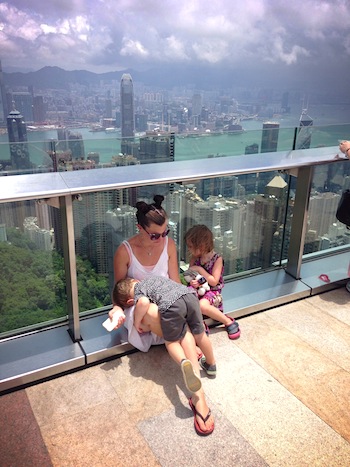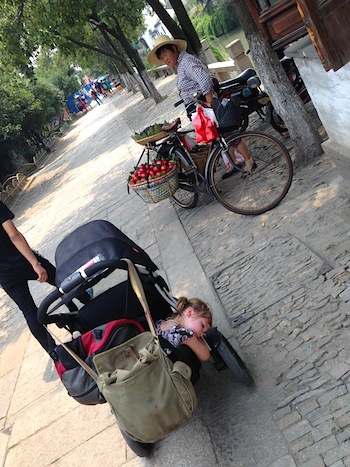Disclaimer: The observations below are generalizations that could come off as negative stereotypes (which is not my intention) and certainly do not represent China as a whole, but rather, the small sliver of life I’ve been exposed to – from my own naive western perspective, wink.
We are an American family of four living in southern China. I’m often questioned about what my experience is like living here with two young children (they’re 2.5 and 4.5). Is it difficult? Culture shock? How are the kids adjusting? And generally, my answer is something to the tune of we’re great! Surely it’s not because we aren’t confronted with new cultural norms every corner we turn – it’s just that we’re open to them (us by choice, the kids by nature). Chinese culture is just about as far as one can get from American culture, as I see it. These two systems are fundamentally different. One rooted in communism, the other in self-determined, independent democracy. As such, each culture has evolved very different cultural norms – norms that often produce a non-judgmental, furrowed brow.
Before I go on, let me give you a little back-story. The need to understand and experience new cultures is very much part of me. Thus, after I became we and we became three, and then quickly, four, I knew that putting my wanderlust on the shelf wasn’t an option. Our children have been on more planes and trains than I had been on until I was well into my 20’s (though, I’m not so proud of the carbon footprints we’re making for them – a tradeoff I don’t know how to remedy). We’ve taken so many 14-hour flights at this point that I don’t even blink an eye at a 5-hour flight – they know the drill all too well. And so, when my husband was presented with an exciting new job opportunity that meant relocating to China, we [for the most part] gladly accepted.
One of the most spectacular qualities in a child is their ability to adapt and recalibrate to a new normal. I believe that this is because whether they have spent their entire life living on the same street, or have lived a life on the road, their perspective is ALWAYS fresh and ripe for discovery. In this way, as a child, living abroad really isn’t all that different than living in the same house they cried in as a newborn – there will ALWAYS be new discoveries to make and new information to absorb.
Often times, I expect my children to react more profoundly when confronted by new culture, or rather, for them to validate my reaction.
Isn’t it peculiar how everyone pushes and shoves to get on and off the train, with seemingly no acknowledgment of his or her neighbor? Children: isn’t this just how people do it? (Housing more than 1/7 of the world’s population, China’s people have evolved to have little space recognition – out of shear necessity. So unless you’re related, good luck not getting cut in front of getting onto an elevator…7 months pregnant, holding the hand of your two year old child.)
Don’t you find it strange that we’re being served chicken feet as our gratis appetizer? Children: silent while chewing on said chicken foot. (Chicken feet are only one example of the obscure – to me – animal parts people chew on here.)
Holy mother, did that dude just hawk a loogie on the sidewalk next to me? Children: yes mom, yes he did. Wait, what’s a loogie? (Spitting in public spaces is a norm that is on its way out, thankfully.)
If another car tries to cut me off as I cross the street [while holding the hands of two young children – on GREEN], I’m going to cry. Children: Calmate mama, calmate. (Chinese car culture has only just developed over the last few decades and for some reason has evolved as CAR IS KING and pedestrian as road-block, which makes you feel like an ant waiting to be squashed.)
As you see, being from a western culture (and particularly the United States, where personal space and property has very much defined who we are), living in China takes some perspective adjusting – and child rearing is no exception.
On infants: babies are often bundled and wrapped and smothered while outside, as I pass by with a sweat drenched forehead and shorts on – our cleaning lady often gestures her disapproval/concern over our children running around naked in the air-conditioned apartment.
Babies and toddlers are often dressed in splitpants (pants/rompers with a slit up the bum, basically) – to support the Chinese form of Elimination Communication – which they’ve been practicing for, oh, I don’t know, a few hundred more years than us westerners. I’ve been told that older Chinese women see diapers as a sign of lazy parenting.
Most babies are cared for by their maternal grandparents. It warms my heart right up every time I see a grandma carrying her grandchild around in her oh-so-cute matching pajama set. Grandparents care for their grandchildren until they are school age so that the mother is able to work – this way, adults can work in their most productive years (though I could argue that being an at-home-parent/grandparent is the more difficult position).
On young children: most evenings you can find kids playing outside until 9 or 10pm and then up ready for school and out the door by 8am – our kids are in bed by 8pm and we’re lucky if we’ve remembered to put on underwear when the little lady leaves for school at 9am. The main reason for this is because it’s a sub-tropical, most often hot and humid environment, so being active at night just makes sense.
Children are served mostly warm beverages because it is thought to be better for digestion (adults also most often abide by this rule) and kids drink formula until they’re well into their toddler years – our kids are regularly offered warm milk at restaurants and brought warm water – our two year old has learned to be clear that he wants bing – cold, water.
On car seats: they don’t exist. Well, rarely. Because a Grandparent most often accompanies the parents, someone is always in the back of the car to hold the child. My first Chinese friend had such a hard time imagining me out and about by myself driving with two children.
On school: kindergarten starts at age 2.5 and often times even earlier. And we’re talking Monday through Friday, from 830 to 4. Which basically makes it daycare, but it’s not, it’s very much “school”. The fact that I still have an almost 3 year old at home with me is strange.
On TWO blonde children, only two years apart: The phrase, liang ge! – translated, simply means 2! I’ve heard this short phrase iterated with exhuberence upwards of a thousand times since we arrived in China. Though we do hear it while the kids are scampering about, nothing brings in the liang ge’s! like strolling down the road (or through a tourist site) with a Phil and Teds double stroller filled with two blond-haired children who are often mistaken as twins. The kids are beckoned for photo op’s with strangers on a daily basis. We’ve considered doing a little social experiment and setting up shop at a touristy location and charging 5 Chinese Yuan per photo – we think we could make at least 500 Yuan in a few hours. I’d say that the kids are agreeable 60% of the time – they’ve made it into thousands of travel albums at this point.
On mothering and life: kids and houses are kept IMPECCABLE, yet you very much get the feeling that a staff infection could be picked up on every street corner. A perfect example of this happened right in front of me recently – a young girl was told to pee right in the middle of the side-walk, but her mother/caregiver was sure to pull out a tissue and wipe her afterwards (if that had been me, it would have been dirt, with no wiping,). I’m in NO way a germaphobic mom. My kid’s fingernails are regularly found dirty and I’m only good about washing hands after climbing around at playgrounds half of the time. And then we moved to China. Now, their fingernails are actually clean most of the time and I don’t go anywhere without hand sanitizer. However, they are often found with food spattered faces and I can’t tell you how often a Chinese woman pulls out a tissue to do the job for me.
In the same regard, children are doted on by their caregivers like flies on horse poop. I’ve learned to just politely smile, rather than mumble a snide remark, when a woman clearly perceives my lack of hand holding as neglect. My kids are jumpers and can regularly be found dismounting off of four or five stairs; when this act is witnessed by a Chinese woman, it looks to cause the skip of a heart beat – but is almost always followed up with a warm, giggly smile.
Nannies and cleaning ladies are the norm (they are called ayi’s – translated, means Auntie). Before moving here I had NEVER paid anyone to help clean my house. In China, just like most other developing places, labor is cheap and so everyone, foreigner and Chinese alike, take advantage of the affordable help. Most families I know have full time help, 6 days a week. It is normal to see a mom out walking her baby in a stroller, with an ayi by her side (and, sometimes, a grandparent as well). Though I still have a bit of a guilty complex surrounding it, we do have an ayi who helps clean three days a week, three hours a day – and I’ve got to say, it’s pretty amazing.
We live in a very international apartment compound (roughly 50% foreigners, 50% Chinese), with expats from all over the world. Because of this, there are restaurants, bars and grocery stores that cater to foreign tastes and make the area feel much less China-like. For us, being here is largely about experiencing the culture and so we try to walk beyond our perimeter as often as we can – which only means walking a few blocks. A short stroll from our apartment and we could find ourselves in a variety of culturally interesting locations: a make-shift fish market, where you can buy live fish directly out of small plastic tubs. A variety of seafood restaurants, with fish proudly being displayed in tanks outside – the kids treat them as their own personal aquarium EVERY time we pass one – which could occur up to four times in one walk – it’s a regular battle to get them to move on. Or a wet-market, where sides of pig, fresh tofu (available in 10 different forms), and live chickens, make for a true dazzling of the senses.
A morning stroll may take us past a few dozen people doing Tai Chi, a group of men sitting around a table drinking tea and playing Mahjong, or to a restaurant to eat food that we are only accustomed to eating for dinner. An evening stroll often finds us passing large groups of women dancing (for exercise) in a courtyard, kids in roller-blading lessons (we didn’t realize that people did this anymore) on a random sidewalk, and small groups formed serenading the park with their music. Here, rather than turning on the television after dinner, people go outside – which is so refreshing coming from the United States.
Our 4.5 year old daughter attends a Chinese Montessori school and our 2.7 year old son will start later this fall. Our hope is that when it comes time to leave, we’ll all have a firm grasp of the language (Mandarin) that we can take with us wherever we’re headed next. As time passes, I’m sure that we’ll all culturally recalibrate and before we know it, we’ll be cutting in the train line and encouraging our kids to pop a squat in (or around) the street – OH WAIT, we already do – we’ll see about spitting and chewing on chicken feet.
Experiencing and sharing the world with our children is a priority for us – adventuring together, learning together, and broadening our perspectives together. My hope is that our children will grow up open to and understanding of new cultures, ready to embrace and be stewards of the vast, beautiful, and magical world around them.
Lauren writes about family travel and muses about motherhood at safariRoo.



